
By NICK GOSNELL
Hutch Post
HUTCHINSON, Kan. — How does the emergency room at Hutchinson Regional Medical Center decide who goes first? It's part of a national standard called the Emergency Severity Index.
"What it does is it provides a stratified way of looking at presentation, vital signs, symptomology and complaint to help kind of judge who the physician should prioritize first," said Jarrod Urban, Nursing Director for Emergency Services at Hutchinson Regional. "Our goal is to always get every patient in front of a physician as soon as possible. Let's face it, that's the reason somebody's there. They want to come in, see the physician, try to figure out what's going on and then we make a decision from there."
Time-critical problems like heart attack, stroke and excessive bleeding are at the top of the list, with those needing multiple resources, but otherwise stable, going before those who may be stable and need only a single resource.
"We're getting calls from states away, Texas, Colorado, Nebraska for admits, just because nobody has beds," Urban said. "One of the benefits we have with Reno County EMS being a part of our system is Reno County EMS always has a path to us. If we have really sick patients, like we tell patients with stroke, the best outcome is to call 911 and get an EMS person out there as soon as possible. We always have availability to take care of those patients."
In fact, stroke is the time-sensitive condition Urban wishes more people would come in sooner to address.
"The minute you start to have any of those symptoms, facial droop, you're not able to lift one side of your body, problems with speech, even eyesight, come in," Urban said. "Eyesight's a big one that we miss. People think that all of a sudden one of their eyes going blind is a optometrist issue, they need to go see their eye doctor, when really its a stroke issue. We need you to call 911 and come in to see us right away. The quicker we get to you, the more likely we are to be able to give you some of those medications that can reverse the stroke. It's really amazing just how well those medications work, but it's all a timing issue."
Urban said that the biggest difference between the ED here and elsewhere in the country is that you can usually get in to see a doctor within 15 minutes here, but on the coasts, some conditions can take hours to be seen.





